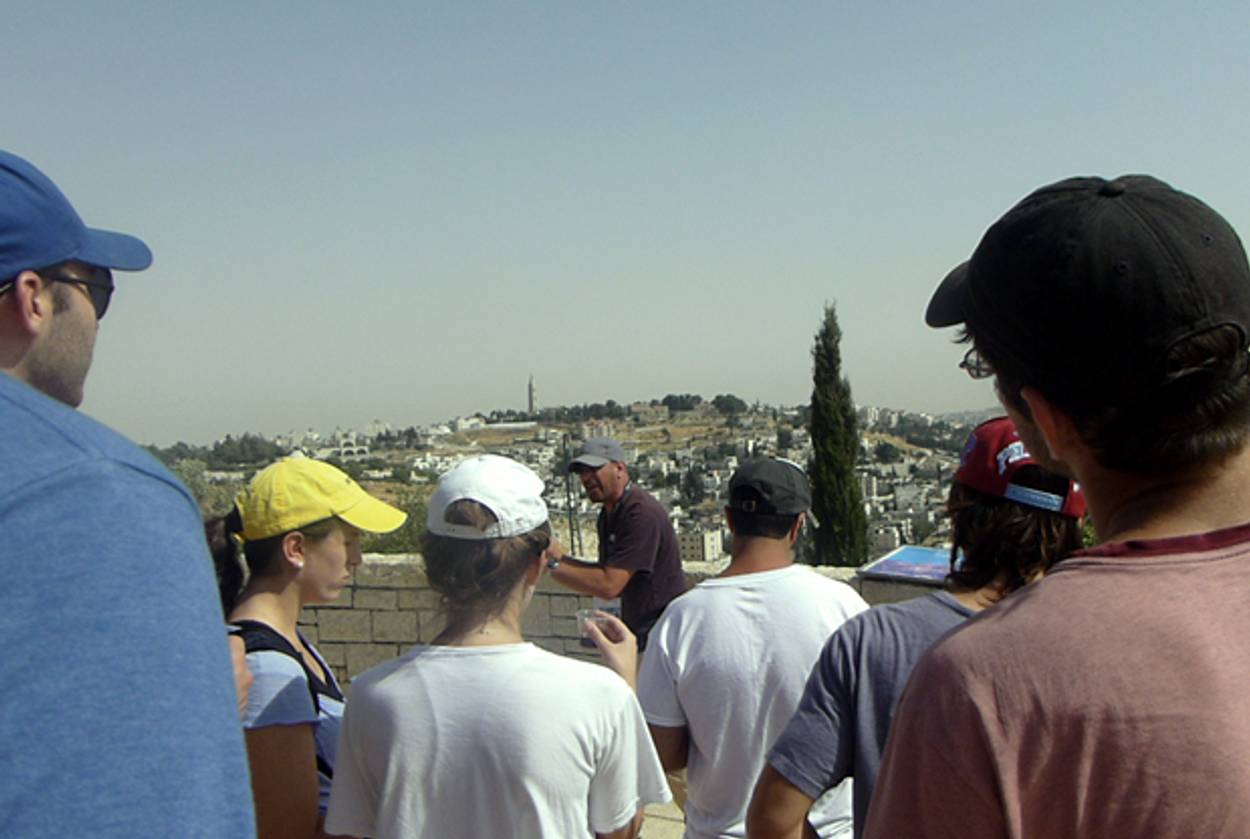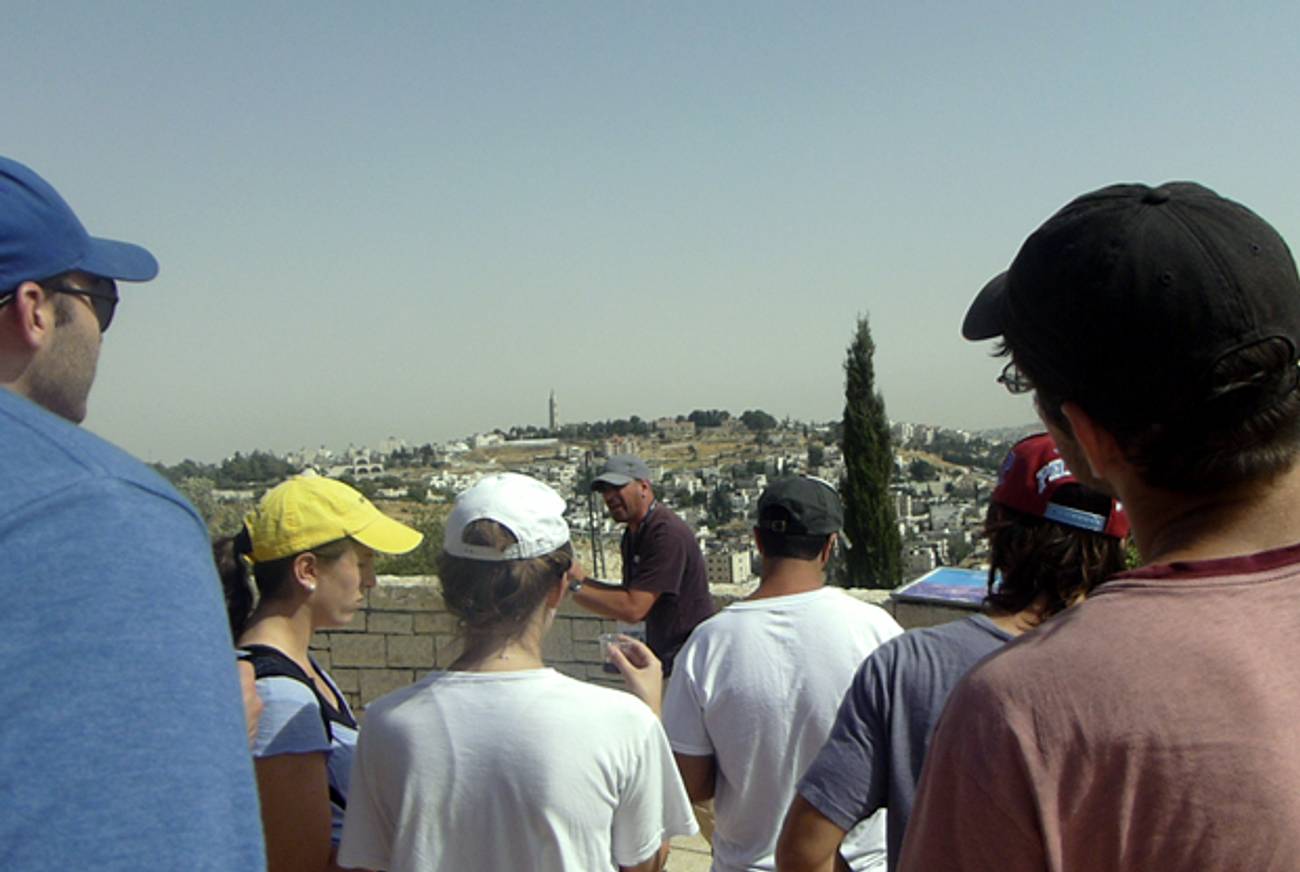Why the Jews Aren’t in Uganda
Israel as our homeland because our ancestors were here. No religion required.




Yesterday at around six in the morning, our tour educator Yoav told us that the destruction of the Second Temple was, in his opinion, a greater Jewish tragedy than the Holocaust. He made the case partly through numbers, arguing that as a percentage far more Jews were killed in far less time by the Romans than by the Nazis. But his prime case was more profound and goes right to the heart of what he, through Birthright Israel, is trying to teach us.
There is much to be said about Yoav, all of it—at least if you asked me—positive. We’ll have plenty more about him in future days. For now, and at the risk of not using extra evidence we will gain today when we tour Jerusalem (or “Yerushalayim” as Yoav insists we will be calling it), I’d like to focus on his pedagogical method and, really, larger theory of Israel.
Yesterday, at Masada, in the Judean Desert, and finally on Mt. Scopus overlooking the Old City, Yoav has used the writings of the Prophets—the Nevi’im, as I seem to recall from Hebrew School—as quasi-historical sources, as well as actual historical sources, to help us understand “just how much Israel is your home.” It’s sort of religious Zionism without the religion, or really without the theism: The use of sacred writings to make the not-necessarily-sacred point that Israel is the proper homeland of the Jewish people.
Take Masada, for example. Yoav only told the story of what happened there in 73 C.E.—the decision of nearly 1,000 Zealots to kill themselves rather than succumb to Roman conquering—after giving a much larger narrative of what the Jews had been up to during the prior millennia. Here he referenced the Temples and the Edomites and the rest and relied on sources like the Book of Samuel. Such books, though not as reliable as your average historical source, do describe basic truths. Namely, the Jews did live in what is now Israel (specifically, largely in what is now Jerusalem and the West Bank, though they also resided in the Negev Desert). Their sense of nationhood—wrapped up, of course, in the religion of Judaism—was dependent on living in or near Jerusalem and the Temples; David was the king of the kingdom of Israel; and so on and so forth.
Why is this important? Get into any discussion about Zionism and you will quickly run into what could generously be called a paradox and, less generously, a contradiction. Because, sure, many might say, the Jews deserve a national homeland as much as any other people—perhaps, given their history of being persecuted, a haven is a downright necessity. But why not put it in Galicia, which used to have a ton of Jews? Or Uganda, where they can really do the land some good? Or Alaska, where they won’t get in anyone’s way? How instead did Theodor Herzl and the earlier Zionists—nearly all of them secular—decide that what was then a small slice of the Ottoman Empire had to be the Jewish homeland? Zionism is, at least in its original conception, an avowedly secular ideology that nonetheless commanded the Jews to redeem the land allegedly promised to them by God. How does that work?
And Yoav provides a partial answer: Forget religion, he says. The Jews—our ancestors—were here. If we are seeking to restore Jewish self-sovereignty, it makes sense to physically locate it in the last place where Jewish self-sovereignty existed. Add in the fact that this self-sovereignty was taken away from us (twice, with the destruction of the Temples), and you have a case for Israel that—though, like any nationalism, certainly contains mystical and even spiritual elements—isn’t really religious and is therefore compatible with both a secular ideology and with appeals to such things as the universal conscience and morality.
If you apply enough pressure to this logic—pressure that, admittedly, I feel unequipped to apply given the amount of sleep I’ve gotten in the past four days (enter the brainwashing conspiracy theories*)—it can be a dangerously slippery slope. If Zionism means redeeming the biblical Land of Israel, that means redeeming the West Bank. If you believe that, compromising with the Palestinians becomes much less attractive, which should be politically troubling to any good, modern liberal, no matter how religious or spiritual or proudly Jewish.
But there’s a power to Yoav’s argument all the same. And that power becomes overpowering—spiritual, but not necessarily religious—when you are told it not in a classroom in New York City but while standing where the Zealots drew lots over who would be last to die; while hiking in the Judean Desert where David hid from Saul; and, yes, while looking on the spot where the Temple used to stand. It would seem that Birthright Israel—whose CEO told me that it is unafraid to stand up for the right of Jews to have Israel as their own—is working.
* Here’s another anti-Birthright Israel conspiracy theory for you: Is it a coincidence that it’s on the day that you’ve gotten up at the crack of dawn, hiked up and down Masada, swum at the Ein Gedi reserve, and floated in the Dead Sea that you then, surely asleep, make your one drive through the West Bank, up along the Jordan and then west to Jerusalem, passing Jericho along the way? Probably, but eat your heart out if you believe otherwise.
Marc Tracy is a staff writer at The New Republic, and was previously a staff writer at Tablet. He tweets @marcatracy.
Marc Tracy is a staff writer at The New Republic, and was previously a staff writer at Tablet. He tweets @marcatracy.